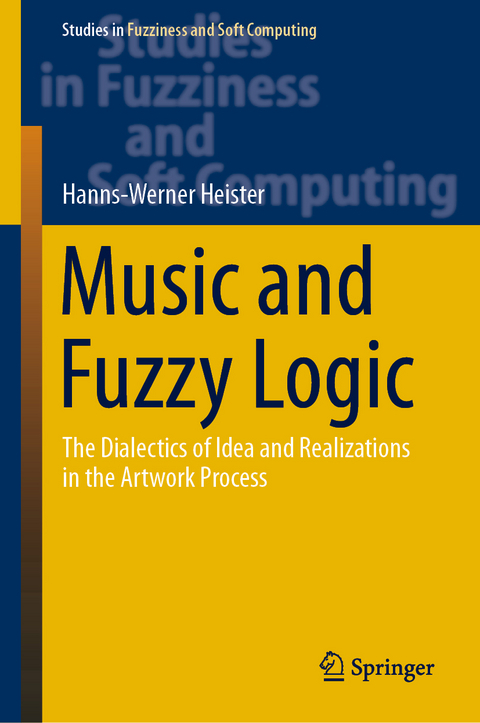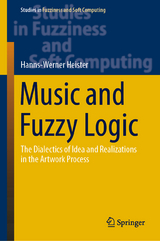Music and Fuzzy Logic
Springer Berlin (Verlag)
978-3-662-62905-5 (ISBN)
This book unfolds the manifold, complex and intertwined relations between Fuzzy Logic and music in a first comprehensive overview on this topic: systematically as an outline, as completely as possible, in the aspects of Fuzzy Logic in this relation, and especially in music as a process with three main phases, five anthropological layers, and thirteen forms of existence of the art work (Classics, Jazz, Pop, Folklore). Being concerned with the ontological, gnoseological, psychological, and (music-) aesthetical status and the relative importance of different phenomena of relationship between music and Fuzzy Logic, the explication follows the four main principles (with five phenotypes) of Fuzzy Logic with respect to music: similarity, sharpening 1 as filtering, sharpening 2 as crystallization, blurring, and variation. The book reports on years of author's research on topics that have been only little explored so far in the area of Music and Fuzzy Logic. It merges concepts of musicanalysis with fuzzy logical modes of thinking, in a unique way that is expected to attract both specialists of music and specialists of Fuzzy Logic, and also non-specialists in both fields. The book introduces the concept of dialectic between sharpening and - conscious - "blurring". In turn, some important aspects of this dialectic are discussed, placing them in an historical dimension, and ending in the postulation of a 'musical turn' in the sciences, with some important reflections concerning a "Philosophy of Fuzzy Logic". Moreover, a production-oriented thinking is borrowed from fuzzy logic to musicology in this book, opening new perspectives in music, and possibly also in other artistic fields.
lt;p>Hanns-Werner Heister, Prof. Dr. phil., received his university education in Musicology, German Studies, Indo-European Studies and Linguistic, in Tübingen, Frankfurt a. M. and Berlin (Technische Universität Berlin). In 1977, he received his Dr. phil in Musicology at the Technische Universität Berlin, under the supervision of Carl Dahlhaus; in 1993, he received his Habilitation from the Carl-von-Ossietzky-Universität Oldenburg; 1992-1998, he served as a Professor for Musical communication and History of Music at the Musikhochschule "Carl Maria von Weber" in Dresden; 1998-2011, he served as a Professor for Musicology at the Hochschule für Musik und Theater Hamburg. Furthermore, he worked as a freelancer for various radio stations, journals and newspapers and has been teaching at various Schools of Music and Arts, such as the Musikhochschule in Berlin, the Universität Hamburg, the Hochschule der Künste in Berlin, at the Technische Universität Dresden and at the Universität Wien. He also was a Visiting Professor at the Musikhochschule Weimar. He held seminars on musicology in Schools of different countries, such as the Universidad Nacional de Costa Rica, in Heredia, Costa Rica (in 2012), the Victoria University of Wellington, New Zealand (in 2013), the Conservatorio "Arrigo Boito", in Parma, Italy (in 2014), and at the Hochschule für Musik Saar, in Saarbrücken, Germany (in 2016). Author of different books in the field of music history and musicology, his research has been dealing with various topics, such as: methodology of musicology; aesthetics, sociology, history, and anthropology of music; political, popular music, new music and jazz; music and musical culture in Nazism, resistance movement and exile. Further topics include: aesthetics and history of music theatre; media/technology and institutions of music culture; music analysis; fuzzy logic and cybernetics; and gardening.
Chapter 1: Introduction. Fuzzy Logic's Four Art-related Principles and Five Phenotypes in the Musical Process.- Chapter 2: The Structure of the Music Process and the Work's Thirteen 'Forms of Existence'. Identity in and as a Process, against and through Differences.- Chapter 3: Fundamental Fuzziness: The Imperfect Perfection.- Chapter 4: The Principle of Similarity. The Resultant of Identity and Difference.- Chapter 5: The Principle of Sharpening (I): Filtering, Cosmos out of Chaos - Aspects and Elements of Musical Materials.- Chapter 6: The Principle of Sharpening (II): Crystallization. Development and Advancement of Musical Shapes.- Chapter 7: The Principle of Blurring. Conscious, Artistically Produced Blurrings.
| Erscheinungsdatum | 29.03.2021 |
|---|---|
| Reihe/Serie | Studies in Fuzziness and Soft Computing |
| Zusatzinfo | XXX, 724 p. 218 illus., 34 illus. in color. |
| Verlagsort | Berlin |
| Sprache | englisch |
| Maße | 155 x 235 mm |
| Gewicht | 1292 g |
| Themenwelt | Informatik ► Theorie / Studium ► Künstliche Intelligenz / Robotik |
| Technik | |
| Schlagworte | Appropriation of Music • Coincidence and Necessity • Dialectics of Mimesis and Poiesis • Earworm • Forms of Existence of Music • Musical Logic • Musical Material • Musical Mimesis • Musical Turn • Music and Noise • Music as a Model of World View • Neurosciences and Music • Philosophy of Fuzzy Logic • Processing Identity • Real Tones • Sharpening as Crystallization • Sharpening as Filtering • Sharpening Versus Blurring • Theory of Similarity • Virtuosity/Virtuoso (Music) |
| ISBN-10 | 3-662-62905-4 / 3662629054 |
| ISBN-13 | 978-3-662-62905-5 / 9783662629055 |
| Zustand | Neuware |
| Haben Sie eine Frage zum Produkt? |
aus dem Bereich




